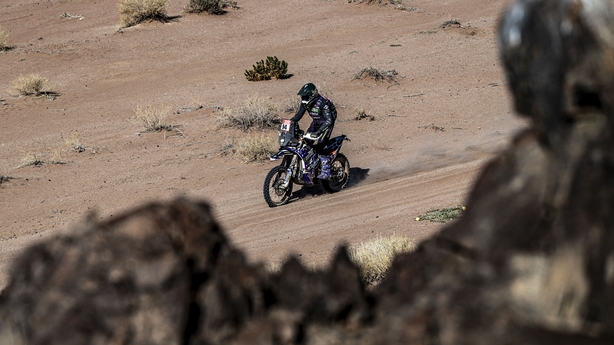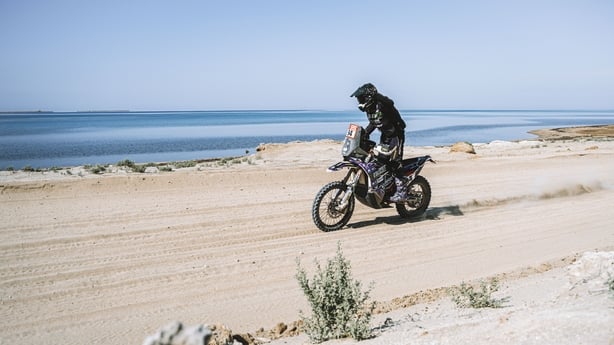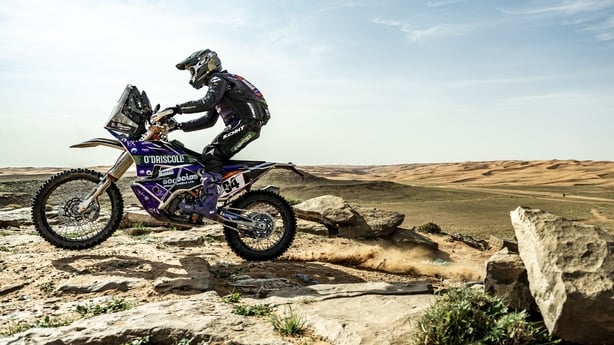You would think that after running the gauntlet of a two-week 9,000km trek over sometimes inhospitable terrain, that it would be almost impossible to muster the energy needed to get the corners of your mouth to curl upwards.
But motorcylist Oran O'Kelly is all smiles when he chats to RTÉ Sport, barely a week after crossing the finish line at the prestigious but physically and psychologically punishing Dakar Rally, which was originally founded as the Paris-Dakar Rally back in 1978.
By taking part in this year's edition which was held in Saudi Arabia, the 30-year-old became the first Irishman to participate in the race since 2013.
Just getting there was difficult. To raise the funds, along with support from his main sponsor, he sold his car valeting business back home in Ireland before heading back to the Arabian gulf to begin his journey.
Riding for the Vendetta Racing UAE team, the last three years were all about tackling other World Rally-Raid Championship races including the Abu Dhabi Desert Challenge to build himself up.
Then last year, he got a first taste of what of a Dakar Rally looked like as a volunteer for the Audi team, where he served in a role driving a campervan and cleaning toilets.
But this January is when he fulfilled a childhood dream of completing the Dakar Rally's motorcycle category for Vendetta.
Coincidentally he crossed the finish line on 19 January at the same time as Carlos Sainz Sr - two-time former World Rally champion and father of the Formula One star - who won the car category for the Audi team that O'Kelly had been cleaning toilets for 12 months earlier.
"It was a huge leap forward from the last year, from supporting that team and competing with them and crossing the finish line was something magical," said O'Kelly, who was born in Dubai to Irish parents before the family, who are lifelong motorcycle enthusiasts, returned home.
Magical but also physically taxing with O'Kelly shedding seven-and-a-half kilos of bodyweight through the travails on the bike through wild temperature swings, all manner of gradients, obstacles and landscapes over a span - as the crow flies - that covers a distance equivalent to Dublin to Cape Town. Added to that, the only rest coming at the campsites between each stage where the facilites were, as is tradition, basic and minimal.
Even for all the preparation races he had done, the first stage of the Dakar Rally proved to be a shock to the system.
"It's on a completely different level. It honestly made some of the other races, even some of the World Championship rounds, look like child's play," he said.
"The first day absolutely knocked me onto my rear. I struggled hugely technically with it and mentally with it as well and really had to pick up the pieces of my confidence and put it all back together.
"For two hours during the first stage I was in complete shock. I'd spent it completely on my own on a 15 kilometre passage that I was 100% sure I was lost.
"Then when I got to the end of it, my GPS beeped and confirmed that I was in the right direction. I nearly felt a small sense of shame coming back to the bivouac (campsite) with just how under-prepared I felt and when I got back to the bivouac, strangely enough I found massive comfort and camaraderie in how everybody else felt.

"I could see by the look on people's faces how much everyone had struggled. And I'm not talking about amateur first-time weekend warriors like myself. Some of the top, top pros and professionals, like guys finishing in the top five, were absolutely shook.
"But that is Dakar and that's what it is designed to do. It's designed to be the ultimate test of an off-road motorsport event, to put people to the test, to really question people whether they believe they belong there as well."
It can be likened somewhat either to successive Ironmans or to the Tour de France in the sense that it is broken down into daily stages and O'Kelly found that the best way forward was to break it down section by section and day by day to avoid getting overwhelmed.
He also leaned into his mother's experience as a qualified sports and performance psychologist to manage the mental strain on the road.
The danger was also at the back of all competitors' minds, heightened by the tragic fate of Spanish motorcylist Carles Faclon who died just over a week after a fall on the second stage.
"It was a very emotional time for a lot of us to know that a competitor was gone. I think a lot of us knew a lot sooner than the organisation and then the media found out about it," said O'Kelly.
"That risk is always there (for us competitors) but fortunately for us, on behalf of the organisation, there have been enormous leaps and steps forward in the last five years that I've been aware of the event in terms of safety. A helicopter will be with you when you hit a button after five minutes.
"The safety equipment itself has made steps forward and we have a full airbag device that goes off when you come off the bike, although all these things are never 100%."

While O'Kelly had described getting to the Dakar start line as akin to trying to become an astronaut and getting to the moon, the event itself has an otherworldly sense with some of the desert landscapes emitting an almost martian feel.
"There must have been at least ten times when I was riding the bike and I lost a bit of attention and a bit of focus, and I was looking at the view and the scenery and thinking, 'This is absolutey incredible'," he said.
"But within two seconds then, the front wheel would bounce off a rock and the whole bike would move sideways and you'd have to react very quickly to it.
"So you were always reminded of being focused on the task at hand. But we passed incredible scenery in the Saudi Arabian gulf, some volcanos we passed that looked like they were actually moving by the sand and the wind, some incredible scenery especially in places like AlUla, which looked like something out of a Star Wars film. It genuinely didn't look like planet earth."

O'Kelly ultimately finished 57th in the motorcyle category but the main achievement for any Dakar competitor, especially a first-timer, is just to get over the line and he is keen to return and tackle it again in the future once he's fully recuperated.
"I have an enormous amount of work to do to be honest with you. I thought I was quite well prepared and had done as much research and experiences as I could but (I was) definitely caught in a few areas where I definitely could have been better prepared, so there have been a lot of notes taken," he said.
"I'm just going to decompress for the next week and then start building and thinking what could be possible but for sure there's unfinished business.
"I definitely went this year, with the full focus on completion. I'd love if there was another opportunity to go back to focus on being a bit more competitive.
"I have one under my belt and I think I have a very good feel for what the expectations are throughout the 14 days to really go at it better prepared and in a better positions to go after a couple of better positions."


